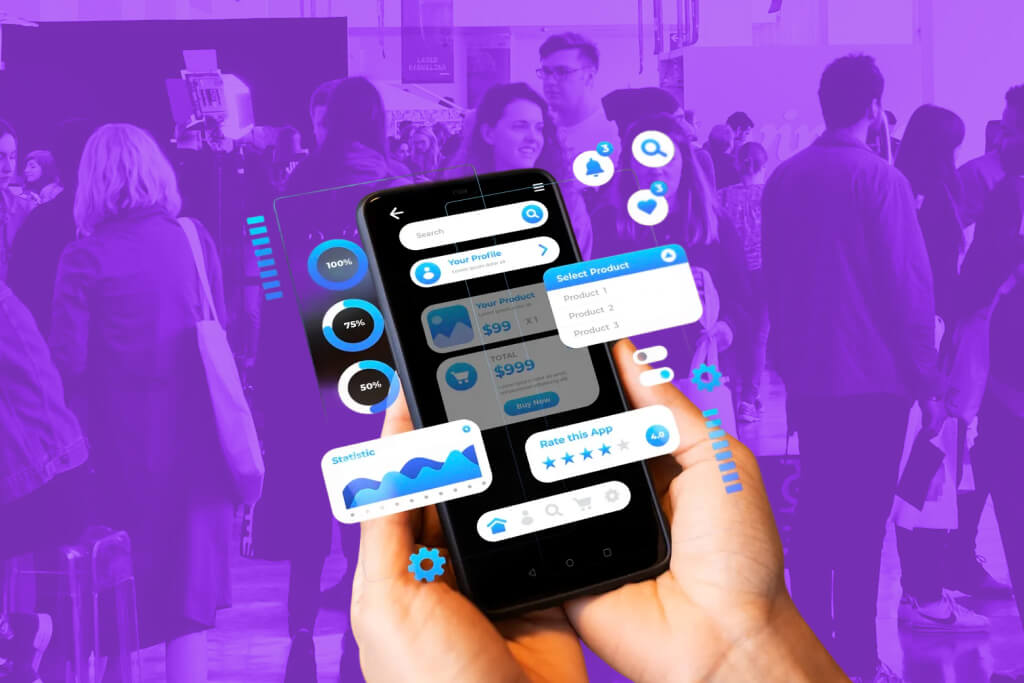Key Takeaways
Event Management Systems streamline events, automate processes, remove systemic issues, and eliminate budget overruns with its smart features.
Planners can prepare for all stages of the event lifecycle starting from pre-event setup, event day execution and post-event analytics.
mproved engagement, targeted networking, streamlined registrations, faster check-ins, easier speaker management are made possible with Eventify’s End-To-End Event Management Software and App.
What is an Event Management System?
An event management system helps event planners and organizers streamline their pre-event planning, event day execution and post-event operations . An event management system is often complemented with an Event App that enhances the attendee experience and helps planners improve engagement. Traditionally most event management systems were on-premise solutions which limited its capabilities. Today, solutions like Eventify are cloud-based, allowing easier access and mobility of information. Equipped with such systems it's easy to host hybrid, virtual or in-person events.
Why Do B2B Event Planners Need an Event Management System? The Benefits of an Event Management System
1. Streamlines complex B2B Events, Tradeshows and Conferences.
Event Planners lead stressful lives! Be it the long nights dedicated to pre-event prep, or the 100 messages exchanged with vendors. Venue scouting, catering, budget planning, phew…we got tired listing the endless tasks, so we can imagine how frustrating it gets for you. Event Management systems are designed to eliminate event chaos. They make the lives of event planners easy by automating manual tasks, improving event engagement and offering insights on post-event metrics. Whether you are hosting hybrid, virtual or in-person events, an Event Management System adapts to your event type and needs.
2. Automates time consuming Manual Processes.
Manually uploading data, outsourcing badge designs to 3rd party vendors, tracking event budget using excel, or using external email marketing platforms - everything requires coordination, manpower and hours. An Event Management System extensively automates your event, enabling transparent tracking so you miss no updates. This saves precious time, allowing you and your team to create a creative and unique event experience.
3. Reduces Obstacles To Achieving ROI
If you don’t have tools and dashboards to measure metrics like attendee engagement, ticket sales, or leads converted by exhibitors you cannot measure ROI.
Event Management Systems are equipped with advanced dashboards that help track, measure and analyse event data, in real time. This visibility helps you make decisions that benefit your event, change strategies for future events and accurately assess ROI.
4. Eliminates Systemic Limitations Towards Scaling Events
Your events are doing great - engagement is thriving, exhibitors and sponsors are happy and your attendees are becoming a loyal community. Except you are stuck at organizing small scale events. You can’t dream of organizing a hybrid event or even a large-scale one because managing it is a task. An Event Management system helps you do just that - scale with ease and without compounding your expenses.
5. Allows for Strategic Management of Complex Event Data:
Data is your currency. It’s what gives you insights on attendee behavior, event performance, session success, sponsor popularity and so much more. Managing this data is key to cracking the code of event success.
An Event Management system compartmentalises the data, stores it in one centralized platform, and streamlines it for deeper analysis.
6. Eliminates Data Breach Fears With Top Notch Security
It also adds a layer of security that elevates attendee trust in your brand. Eventify is ISO270001 certified and this helps event planners know that their event data is secure.
7. Reduces Budget Overruns With Better Optimisation
Limited budget visibility and tracking leads to overspending. This is an issue faced by over 90% of budget planners. The common complaint: misallocation of event funds. This drastically impacts event ROI and limits what event planners can achieve with their event.
Event management systems have native budget management features that offer real-time expense tracking and help auto calculate differences in estimated budget and spends. With this visibility event planners can make informed decisions. The real-time information allows planners to quickly change strategy and curtail overspends.
It may sound counterintuitive but investing in a budget management system helps reduce your event costs.
Essential Features of An Event Management System - What To Look For When Choosing A Solution

Consider this section a brief checklist of what to look for when investing in an Event Management System. These are broad features that help you identify an intuitive and advanced Event Management System that drives success for your event.
- One unified platform: The problem an Event Management System aims to solve is platform hopping. Planners, like you, don’t have the time to monitor, track and manage information across platforms. When you have complete visibility with one solution, it streamlines your event planning and execution processes. It also makes it easier to give access to your teams without losing control.
- Mobile App Capabilities: Attendees are glued to their phones and so it's essential to have an event app that grabs and retains attendee attention. A mobile app is an extension of your event management software and a tool that essentially drives 90% of event engagement. Attendees can turn to the event app for information or event-centered entertainment and tasks. This fuels consistent engagement.
- Integration Ecosystem: Your CRM, social media channels, payment gateways all come together and work with your Event Management System. It’s key to check if your Event Management System offers extensive integrations. This makes it easy for your data to communicate across channels without manually exporting information.
- Customization Options: It’s your event, and should showcase your branding. An Event Management System must have customization capabilities. So you can add your unique branding and signage to registration forms, tickets, mobile app and landing pages you create for event promotion. Event branding is underrated and can have lasting impact on attendee recall value. So choosing an Event Management System with advanced customization capabilities is a must.
- Support and Service: Tech can falter but the support behind it shouldn’t. For instance, the team at Eventify is always available on live chat to promptly troubleshoot any glitches. Immediate support is essential for an Event Management System since snags are noticed by hundreds or even thousands of attendees.
- Pricing Model: An Event Management System is an investment for your event and not an expense. It only adds more value and growth to your ROI. Yet it's important to consider whether the pricing model or plans match with your event budget needs. So get on a call with the demo team and understand the feature offerings and the value it adds to your event. Also ask for any hidden costs or additional expenses you might incur.
- Security: Data breaches can negatively impact your brand’ reputation for years to come. Today, when data misuse is rampant, your attendee’s data needs to be safeguarded. So ensure if your Event Management System is certified with top notch securities.
Learn More About Event Management Systems Like Eventify https://www.youtube.com/watch?v=GVbib7vLhF0
How Event Management Systems Support Your Event Lifecycle

Stage 1: Event Planning & Foundation Setup
Event Management Systems are mission critical for planners managing virtual, in-person or hybrid events using only fragmented system
Set the foundation for your event and then watch your event build itself.
Event Website & Branding
Branding goes a long way. To promote your event and to get the word out you need a robust event website and landing page builder that:
- Creates customized and branded pages showcasing your event.
- Eliminates the need for external resources and designers.
- Creates your own website or landing page and hosts it on your domain
Registration & Data Collection
Create customized registration forms to accurately collect and store attendee information.
- Getting these forms right is key to the ticketing and badge-printing processes.
- Automate the registration process to reduce hours without compromising efficiency.
- Speed up registration with accurate tracking of successful and pending form fills.
Ticketing & pricing management
Generate and share tickets with exhibitors, attendees and sponsors.
- Create tickets on the software with coupon codes, discounts and expiry dates.
- Track ticket sales via affiliate marketing using trackers.
- Identify total tickets sold, free tickets offered and overall attendance.
Content Organization
Agenda & session management should allow you to create easy to navigate schedules with 0 overlaps
- Allow attendees to add sessions to their event agenda using the event app.
- Give attendees confidence in your event and speakers.
- Provide information and educational experience.
Sponsor, Exhibitor and Speaker Showcase.
- Allow speakers to edit key information, update session details and upload free resources.
- Exhibitors can update product/service information on their independent portals.
- Enable exhibitors to add pricing and product pictures.
- Showcase the best of your event and allow attendees to choose what interests them.
Stage 2: Marketing & Promotion Excellence
Setup complete? Now comes promoting your event and telling everyone about it. Native marketing capabilities give any event management system brownie points.
Email Marketing Automation
Email campaign automation lets you create, send and follow-up on emails with stakeholders from one platform.
- Track opens, responses and clicks.
- Schedule strategic drip campaigns to ensure more sign-ups.
- Leverage one of the most popular ways of promoting events.
Social Media Integration
Leverage the power of social marketing with:
- Community driven 'social wall' for attendee posts and discussions.
- Social boost templates for personalized event images.
- Getting the chatter started around your event.
Performance Tracking
Promo code and referral tracking – Partner with influencers and offer exciting promo codes.
- Identify the impact of marketing collaborations.
- Determine whether partnerships are worth pursuing.
- Powerful tool for marketing strategy success.
Campaign Analytics
Analytics on campaigns – You can't change what you don't measure.
- Identify the impact of email campaigns and social media integrations.
- Observe patterns to replicate success for all events.
- Essential for social media strategy development.
Stage 3: Attendee Experience & Engagement
Event day is scary enough for planners without the added pressure of wondering if attendees are engaged, attentive and participating in sessions or are walking through the venue with their eyes glued to the latest cat videos.
Data Management
Centralized attendee database – Unified platform for contact details, form fills, survey responses and booth visits, helps:
- Build attendee experience on patterns and preferences from pre-event and event stages.
- Gain visibility to execute engagement ideas and track impact.
Seamless Check-in Process
Check-in & badge printing – No attendee has ever enjoyed standing in long queues.
- Streamline check-in process with self-check in options using event app.
- Instant badge printing and modification.
- Save time and minimize stress for the registration team and attendees.
Mobile-First Engagement
Mobile app for attendees – Grab and retain attendee attention from the palm of your hands.
- Help attendees meet a major event goal - networking.
- AI driven matchmaking feature with 'interest tags' and compatibility scores.
- Create event agenda and manage event schedules with ease.
Stage 4: Real-Time Interaction & Networking
Interactive Session Features
Live Q&A, polls, chat – Gather and reflect on attendee feedback.
- Gauge session engagement with live Q&A.
- Recognize what attendees liked or disliked with polls.
- Enable professional connections through live chat.
- Community Forum for continued event chatter post-event.
Networking Solutions
1:1 meeting scheduler – Networking drives event engagement.
- Schedule meetings using digital meeting spaces or venue spaces.
- Keep the networking alive throughout the event.
Engagement Gamification
Gamification tools – Not a buzzword but a tried and tested strategy.
- Improve attendee engagement and give exhibitors much-needed footfalls.
- Spark healthy competition with fun event-centered challenges.
- Keep the engagement brewing with competitive leaderboard displays and rewards.
Real-Time Communication
Push notifications – Even the best laid strategy can change on Event Day.
- Help attendees with instant updates on last-minute changes.
- Send session reminders to attendees, so no session is missed.
Feedback Collection
Surveys & feedback tools – Insights drive growth.
- Learn about speaker performance, check-in experience, and gamification success.
- Create targeted surveys and share with attendees.
- Post-survey analysis for event performance study.
Stage 5: Sponsor & Exhibitor Success Management
Exhibitor Experience
Exhibitor portals – Address exhibitor complaints about missing footfalls or dismal lead conversions
- Create floor plans, categorize booths, add payment options.
- Allow exhibitors the control to choose and pay for strategically placed booths.
- Empower exhibitors with Independent login for exhibitors to create profiles and showcase products.
Lead Generation Tools
Lead capture tools – Physical cards get lost, reminders aren't sent and follow-ups are missed.
- Scan business cards with a simple and quick scan using the Event App.
- Allow exhibitors to scan attendee details, edit information, add notes.
- Schedule follow-ups efficiently.
Sponsor Visibility
Sponsor visibility options – Sponsors make your dream event possible.
- Bring visibility to sponsors by utilising digital real estate on the event app.
- Add sponsor logos and details on splash screens and banners.
- Include sponsor products and services in gamification tasks.
Stage 6: Advanced Technology Integration
Cutting-Edge Innovation Features
Real-Time Analytics
Real-time dashboards – Track, measure and analyse event metrics.
- Access registration, ticketing, speaker session, attendee engagement, and check-in information.
- Identify loopholes and fix them instantly with the help of real-time analytics.
Travel & Logistics Management
Event Itinerary Management – The event feature you didn't know you needed.
- Onboard stakeholder travel plans on the event app.
- Include flight schedules, bookings, venue directions.
- Offer premium experience for keynote speakers and high-profile attendees.
- Manage event schedule and ensure no experience is missed.
AI-Powered Assistance
AI Co-Pilot – AI is trending in event management circles
- Elevate attendee experience and minimize ground staff workload.
- Address attendee questions like "what is the wi-fi password", "where is the next session" in an instant.
- Instant and accurate responses keep attendees tuned into what matters - your event.
Learn More About The Power of AI Powered Event App - https://www.youtube.com/shorts/F0CjGRArZlc
Scalable Broadcasting
Live streaming & video hosting – Events are going hybrid.
- Support transition with attendees tuning in from anywhere.
- Bring more spotlight to your event.
- Web conferencing tech integrations for event scaling.
Eventify: The All-In-One Event Management System
These are mission-critical features you need to support your event. Starting with registrations and ending with post-event feedback surveys - you can manage these operations with different platforms but that costs you time, money and resources. What Eventify does is brings together all the essential features listed above and creates an ecosystem that helps with event planning, execution and post-event analysis. Eventify is truly end-to-end with technology that supports your event without overwhelming your team. Schedule a demo and take a digital tour of our event management system and event app.


.jpg)




.png)



.jpg)


